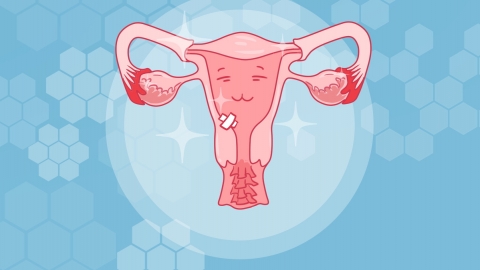Why is my uterine bleeding not clearing up?
Continuous uterine bleeding may be caused by ovulation period bleeding, intrauterine contraceptive device placement, endometritis, endometrial polyps, endometrial cancer, and other reasons. If abnormalities occur, timely medical consultation is recommended. Detailed analysis is as follows:

1. Ovulation Period Bleeding
During ovulation, a temporary drop in estrogen levels in women may cause slight shedding of the endometrium, leading to vaginal bleeding. This bleeding is usually light and short-lived, with no other discomfort in most cases. No special treatment is generally required, just rest and maintaining genital hygiene is sufficient.
2. Intrauterine Contraceptive Device Placement
The intrauterine device may irritate the uterine mucosa, causing aseptic inflammation or local injury of the endometrium, leading to prolonged bleeding. Some individuals may experience mild lower abdominal distension. Treatment may follow medical advice to use BaoGong止血颗粒 (Baogong hemostatic granules), 宫血宁胶囊 (Gongxuening capsules), or 断血流片 (Duanxueliu tablets) to stop bleeding and relieve symptoms. If symptoms persist without improvement, removal of the contraceptive device should be considered.
3. Endometritis
Bacterial infection causes inflammation of the endometrium, leading to congestion, edema, necrosis, and shedding of the endometrium, resulting in continuous bleeding, often accompanied by increased vaginal discharge, lower abdominal pain, and fever. Treatment may follow medical advice to use Ceftriaxone Sodium for injection, Metronidazole tablets, or Fuke Qianjin tablets to control inflammation and relieve bleeding symptoms through anti-inflammatory action and pathogen elimination.
4. Endometrial Polyps
Localized excessive growth of the endometrium forms polyps. The surface of the polyps contains many blood vessels, which are prone to rupture and bleeding, causing prolonged bleeding after menstruation or non-menstrual bleeding. Some individuals may not have obvious symptoms, while larger polyps may be accompanied by increased menstrual flow. The main treatment is surgery, such as hysteroscopic polypectomy, to remove the polyps.
5. Endometrial Cancer
Cancer cells infiltrate the endometrium, causing abnormal proliferation and necrosis, leading to irregular vaginal bleeding. In the early stage, the bleeding is scanty and dark red; in later stages, heavy bleeding may occur, accompanied by foul-smelling vaginal discharge and lower abdominal pain. Treatment options depend on the disease condition and may include surgical procedures such as total hysterectomy. Chemotherapy after surgery may involve Cyclophosphamide for injection, Cisplatin for injection, or Paclitaxel injection to inhibit cancer cell spread and prolong survival.
If uterine bleeding persists without clearing up, self-medication should be avoided, and timely medical consultation is necessary to complete gynecological examinations, hormone level testing, and other assessments to identify the cause and receive standardized treatment. In daily life, attention should be paid to rest, avoiding fatigue and strenuous exercise, maintaining external genital hygiene, and preventing infection.




